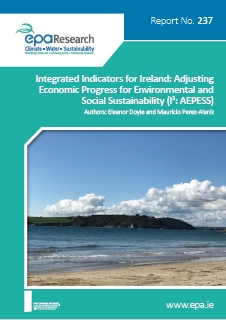Research 237: Integrated Indicators for Ireland: Adjusting Economic Progress for Environmental and Social Sustainability (I3: AEPESS)
Authors: Eleanor Doyle and Mauricio Perez-Alaniz
Summary: Decoupling economic growth from environmental quality is an imperative for Ireland, as with other modern developed economies. Not only has economic growth been linked with environmental sustainability impacts, but more recently social sustainability has also been highlighted in terms of its relationship to, and impacts from, the economy.

Identifying Pressures
A key environmental pressure is adopting a narrow focus rather than holistic and systemic considerations of society’s relationships to the economy and the environment. The measure of ‘sustainable competitiveness’ developed by the World Economic Forum (WEF) is used for a sample of 94 countries over a decade to measure relationships between the economy and sustainability. A further pressure addressed is identification of specific levers of greatest impact for environmental and social sustainability for Ireland, based on advances in international data collection and current understandings of appropriate measures of economic, social and environmental indicators. Achieving decoupling for businesses is also informed by examining the range of ecological innovations by firms in Ireland, and their drivers, generating insight into firms’ sustainable activities.
Informing Policy
A broad range of measures exist globally for economic growth and sustainability that policymakers may use to track and monitor economic, environmental and social progress. Few measures allow for consideration of all three aspects; none over an extended period such as the decade addressed in this project. The selected measure of ‘sustainable competitiveness’ points to areas where greatest impacts on sustainability can be achieved. Broadly, the results confirm there is no necessary trade-off between economic performance and sustainability. Better scores for Irish sustainable competitiveness, compared with economic competitiveness, resulted from strong performance in social sustainability. Sustainability-oriented policies can use the findings that improved innovation indicators exert large impacts on both environmental and social sustainability, to target policy. Substantial indirect impacts on sustainability measures were also estimated for indicators of higher education and training; goods market efficiency; labour market efficiency; financial market development; technological readiness; and internationalisation. For targeting business-oriented policies the project identified the most important drivers of eco-innovation as firms’ strategies; customer perceptions; existing regulation; government grants, and expected regulation.
Developing Solutions
Solutions proposed to improve environmental sustainability impact on the economy and society. In this project’s estimations, the direct impacts on sustainable competitiveness, and its components of social and environmental sustainability were identified. The research found improved sustainability performance could be generated from a set of specific indicators. For social sustainability, the areas where the largest gaps exist between Ireland and other advanced countries relate to health care services and youth unemployment. For environmental sustainability: the areas are stringency and enforcement of environmental regulation; baseline water stress; waste-water treatment; carbon concentration; and changes in forest cover. The project exploited data available from the WEF. As data availability increases over time (e.g. Social Progress Index), performance relative to the sustainable competitiveness measures of this project can be further investigated. Both aggregate and intraregional analysis of the interdependencies of economic, social and environmental aspects may also be conducted. Potential to match regional SPI data with firm-level ecoinnovation data could also support deeper consideration of the social and environmental impacts of eco-innovation,and more general innovation, decisions
https://www.epa.ie/media/epa-2020/publications/research/Research_237_Thumnail[1].jpg